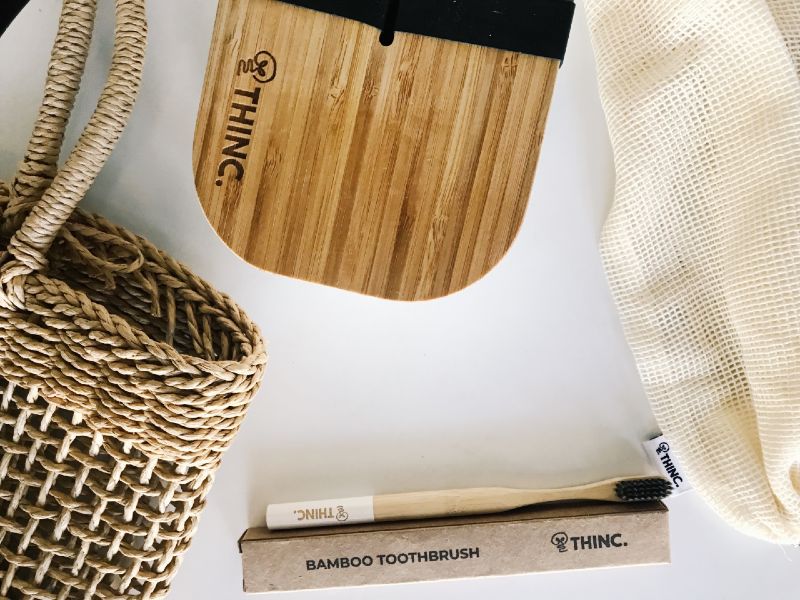Are you looking for ways to become more environmentally friendly, but a little unsure on where to start? It can seem overwhelming at first, but the good news is that you can make a difference by simply being more mindful of your lifestyle habits.
With the our planetary health and the state of the climate growing increasingly more fragile each year, the future of our planet is in our hands. Thankfully, the team behind Thinc Eco have put together some simple changes that you can make today to live a more environmentally friendly life.
Shop locally
Spend your weekends visiting your local produce market, it isn’t only a fun weekend activity to enjoy, but you’ll be supporting local farmers with every purchase. Buying from a mass produced grocery store also means that the food has to travel more to reach your plate, so buying locally will reduce carbon footprint as the food doesn’t need to travel as far. Just don’t forget your reusable produce bags and a shopping bag.
Read more: 30 Sustainable Living Tips That Will Transform Your Life
Cut down on plastics
Did you know that every piece of plastic ever made, still exists today and will continue existing for at least 500 years? Plastic is very harmful for our planet and the animals. Yes, plastic can be a useful product but many of these products are created for single use only.
There are many ways you can limit the amount of plastic you use starting with, switching to bamboo toothbrushes, plastic toothbrushes can take up to 400 years to decompose. By making the switch to a biodegradable bamboo toothbrush, you are taking a step in the right direction.
Plastic isn’t only harmful to our planet but it also carries nasty chemicals that end up in our food, so when packing leftovers in the fridge, be sure to use other products like bamboo lunchboxes, or reusable silicone ziplock bags.
Another way to use less plastic is to bring along your produce bags when doing your grocery shop. Making a conscious effort to bring your own bag will reduce this number and help our planet immensely.
Read more: 6 Lifestyle Hacks For Going Plastic Free
DIY cleaning products
Cleaning products can be extremely harmful to not only our planet, but also our bank accounts. Most of them are packed with ingredients we can’t even pronounce.
We have mastered the perfect all-purpose spray using ingredients you’ll already have around the house. Get the recipe here!
Walk where you can
Motor vehicles play a massive role in the rise in global air pollution. By walking or riding your bike where you can is a great way to create environmentally friendly habits, reduce your carbon footprint as well as get some exercise in. Plus it will save you a ton of money, so it’s win win!
Read more: 7 Weekend Activities That Will Make You More Mindful
Try a plant-based diet
Compared to plants, animals contribute more emissions and need a lot more of everything: food, water, land and energy. Under a plant-based diet, at least half of your plate should be made up of fruits or vegetables, and one third dedicated to wholegrains.
It begins with easy swaps — like cow’s milk for plant milks, chicken for tofu or butter for coconut oil. You might like to start going plant-based for one or two nights a week, then increase to three or four, or perhaps first start removing one thing then and gradually swapping other foods out.
One online resource worth checking out is Plant Proof, which offers a wealth of information on the plant-based diet. On the Plant Proof blog, you will find an ongoing evolution of work addressing different topics ranging from nutrition to sustainability which are relevant to people with different health and performance goals.
Try reducing your meat and dairy consumption by a few meals a week, or even try #meatfreemonday.
Read more: A Healthy Eating Guide That’s Good For You & The Planet
About Thinc Eco
Thinc Eco is a sustainable brand that doesn’t only sell plastic free products, but they are also here to educate you about being more sustainable. Their range of products are made from resourceful materials such as bamboo, wheat and organic cotton.
Need more inspiration?
From weekend travel inspiration, conscious brands to shop and farm to table dining spots; to sustainable living news and wellbeing essentials – This Weekend is the first sustainable living guide for millennials.






